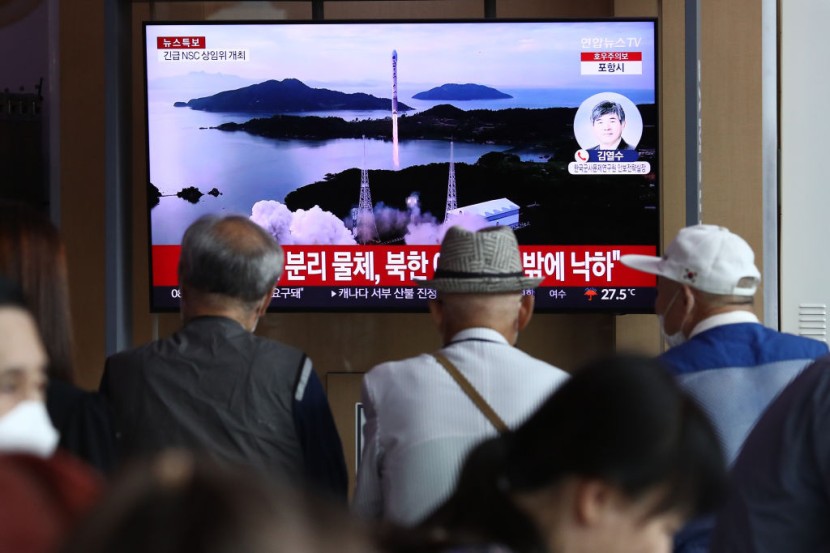
The United States and its allies reacted strongly to North Korea's recent second attempt to launch a spy satellite, which provoked forceful responses from the United States.
The North Korean National Aerospace Development Administration (NADA) launched the launch using a novel type of carrier rocket called Chollima-1, according to The Hill.
North Korea's Second Spy Satellite Launch Attempt Sparks Strong Responses
Despite the failure of the satellite launch, this endeavor has raised concerns about potential security destabilization within the region and beyond. The United States promptly condemned the launch as a brazen violation of numerous United Nations Security Council resolutions.
National Security Council spokesperson Adrienne Watson emphasized that despite the launch's failure, it still constituted a serious violation of international agreements and could potentially exacerbate tensions in an already volatile region. Watson emphasized the connection between satellite launch technologies and North Korea's intercontinental ballistic missile program, highlighting the dual-use potential of these technologies.
The first and second stages of the rocket performed routinely during the launch attempt, according to reports from the official Korean Central News Agency (KCNA). However, an error in the emergency blasting system compromised the flight of the third stage, failing the launch.
The NADA investigated the incident and announced its intention to launch a third satellite in the autumn. The space agency minimized the severity of the failure, implying that the problems were not indicative of substantial reliability issues with the rocket.
Japan's immediate response to the launch was to issue a "J-alert," a system designed to warn residents of impending peril. As the North Korean satellite passed overhead and headed toward the Pacific Ocean, the alert instructed residents in certain areas, particularly Okinawa, to evacuate. This response highlights the region's shared anxiety and concern regarding North Korea's military activities.
The launch takes place during heightened tensions and unpredictability on the Korean Peninsula. Recent missile tests by North Korea have raised concerns, and the failure of the satellite launch has only heightened these worries.
The US Indo-Pacific Command determined that the launch did not pose an imminent threat to US personnel or allied territories; however, it reaffirmed its unwavering commitment to the defense of its regional allies, including Japan and South Korea.
The Joint Chiefs of State of South Korea reported that they detected the rocket soaring above international waters off the western coast of the Korean Peninsula, Aol reported.
Read Also : Pakistan Supreme Court Questions Islamabad High Court Ruling on Ex-PM Involvement In Recent Riots
Geostrategic Implications
The launch originated in the Tonchang-ri region, which houses North Korea's primary space launch facility. Notably, this is not the first time North Korea has attempted to launch a satellite from this location, as a prior attempt in May also failed.
The circumstances surrounding the launch indicate that North Korea's actions may be influenced by broader geopolitical factors.
The South Korean National Intelligence Service (NIS) reportedly warned that North Korean leader Kim Jong Un could resume weapons testing in response to the annual US-South Korean military exercises scheduled to coincide with the satellite launch attempt.
This signaling of potential military action serves as a reminder of North Korea's propensity to leverage its military capabilities in international negotiations. The United States preferred diplomatic solutions in response to the escalating tensions.
While diplomacy remains an option, North Korea must cease its provocative actions and engage in genuine negotiations, according to Adrienne Watson.
This sentiment is consistent with the international consensus that the only way to achieve enduring regional stability is through dialogue and cooperation. In collaboration with US allies and partners, President Biden's national security team continues to assess the repercussions of the failed launch as the situation develops.
The international community's response will determine the trajectory of future interactions with North Korea, so it will be closely monitored. The failed satellite launch is a stark reminder of the complexities posed by North Korea's nuclear and missile programs and the necessity of sustained diplomatic efforts to assure regional stability and security.
The international community has been alarmed by North Korea's second attempt to launch a surveillance satellite. The United States and its allies promptly condemned the action as a violation of international agreements and voiced their concern over its potential security repercussions.
The failed launch highlights the need for continued diplomatic efforts to resolve the threats posed by North Korea's military activities and promote a more stable and secure environment in the region, as per US News.
© 2026 HNGN, All rights reserved. Do not reproduce without permission.








